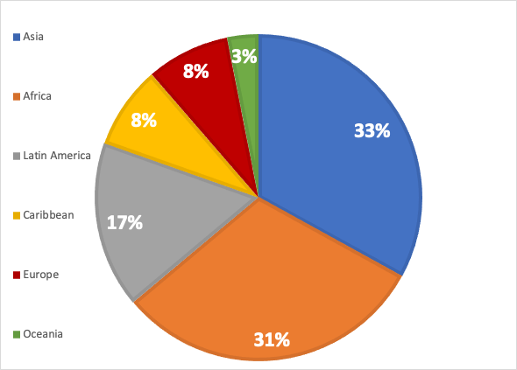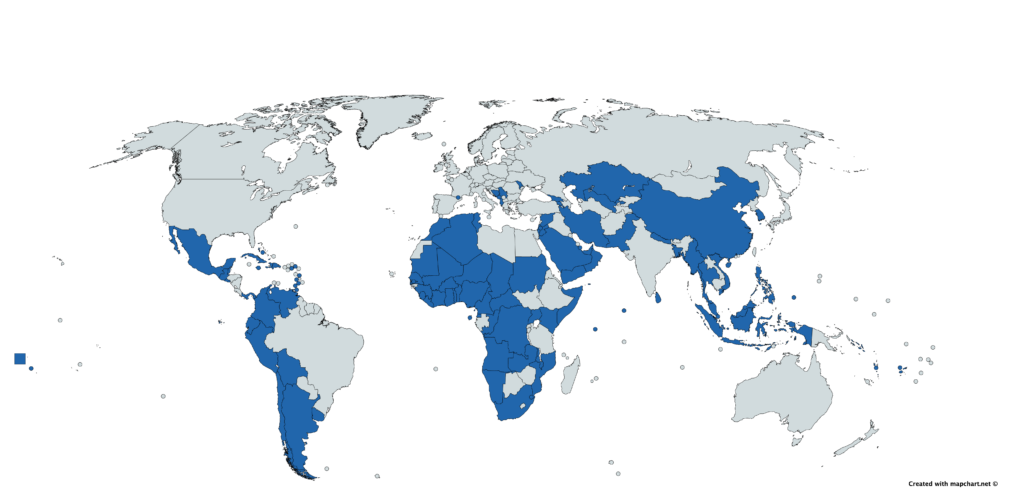The Greenhouse Gas Management Institute proudly delivered the United Nations Framework Convention on Climate Change (UNFCCC)’s Online IPCC Guidelines Training Programme, which concluded this past April. Over 750 participants were nominated by their National Focal Points (NFPs) to the Convention, representing participation from 116 developing countries.
GHGMI’s IPCC Guidelines Course Package consists of the program prerequisite 501 IPCC: Introduction to Cross-Cutting Issues coupled with a sector-specific course, either 511 IPCC: Energy, 521 IPCC: Industrial Processes & Other Product Use, 531 IPCC: Agriculture, 541 IPCC: Forestry & Other Land Uses, or 551 IPCC: Waste. This course series provides a deeply rigorous and comprehensive training on national greenhouse gas (GHG) inventory methodologies.
Participants were awarded a Certificate of Proficiency if they earned a 70% or higher on their course Proficiency Exams. Mary Kwafo – pictured here offering a testimonial of her experience through the program – received certificates of proficiency to support her work for the government of Ghana. These certificates demonstrate the learner’s knowledge and competencies, and are revered in the climate change professional realm as preferred qualifications. 314 learners successfully completed both program’s Proficiency Exams and were presented a Certificate of Training, which underscores the participant’s holistic understanding of the internationally endorsed 2006 IPCC Guidelines. The certificates further demonstrate learners’ capacity to complete a comprehensive and technical training curriculum within an ambitious timeframe (participants were given six months to complete the program).
Out of the 766 original nominees, 11 were either self-withdrawn or withdrawn via their national focal point. Overall, 42% of the remaining participants completed the training program before the deadline, earning two Certificates of Proficiency and one Certificate of Training each. Those who completed the program represent nominees from 97 different developing countries across 6 separate global regions (see chart below).

Well-trained experts are crucial to building countries’ institutional capacity in measuring, reporting, verifying, and managing GHG emissions. GHGMI has partnered with the UNFCCC secretariat for over a decade to train international experts, and is the primary reason our IPCC Guidelines curricula was developed and translated into French.
The transparency requirements under Article 13 of the Paris Agreement stipulate that all Parties to the Convention shall submit biennial transparency reports (BTRs) by December of 2024. BTRs for developing country Parties shall comprise national inventory reports on anthropogenic GHG emissions sources and sinks, as well as a framework to manage the implementation and progress of their nationally determined contributions (NDCs). However, many developing countries are often confronted with significant challenges in meeting current reporting requirements, due to insufficient institutional and technical capacity, insubstantial legislative support for climate action initiatives, as well as lack of internal funding.
This online curriculum aims to address this gap in technical capacity. By equipping individuals with the knowledge and technical skills necessary to accurately measure, report, and verify (MRV) GHG emissions, GHGMI is empowering professionals to engage in and improve national GHG MRV systems. In partnership with the UNFCCC secretariat, our role in this program has also contributed to the increased supply of self-nominated individuals to the UNFCCC Roster of Experts, which supports the official reviews of the national reports under the Convention and soon the Paris Agreement, as well as supporting the UNFCCC’s overall goal to build capacity among developing country Parties to prepare national reports required under the Paris Agreement and to compile and submit quality national GHG inventory reports.
Acknowledgement from the UNFCCC secretariat:The existing domestic framework for measurement, reporting and verification (MRV) has two separate guidelines for developed and developing countries, while the enhanced transparency framework under Paris Agreement consists of a common set of guidelines for all countries, with flexibility for developing country Parties in light of their respective capacities. This significant shift in the UNFCCC process generates great challenges, particularly for developing country Parties who may be struggling to fulfill their existing MRV requirements. As the Transparency Division of the UNFCCC secretariat is responsible for the coordination of the reporting and review activities, we are committed to supporting countries, especially developing country Parties, in planning, building and mobilizing human, institutional, technical and financial capacities to meet their reporting requirements towards the Convention and the Paris Agreement. Therefore, the UNFCCC secretariat offered, for the first time, this online training and certification programme on the 2006 IPCC Guidelines to the experts from developing country Parties of the Convention. The training itself, and the number of nominated experts, that enrolled to the programme, required the mobilization of significant resources from all sides and represented an unprecedented challenge. The results achieved and the number of the experts that worldwide successfully passed the exams have a great importance in fulfilling of our own commitment, i.e. to increase the number of certified experts in each developing country for the preparation and submission of quality national GHG inventory reports, as well as to become part of the pool of experts enrolled on the UNFCCC roster of experts that currently support the review of national reports submitted by developed country Parties as well as the technical analysis of biennial update reports submitted by developing country Parties. |
As a direct result of this collaboration with the UNFCCC secretariat, 97 developing country Parties now have new experts that are considered proficient in the technical skills and knowledge necessary to complete a national GHG inventory according to the 2006 IPCC guidelines.

GHGMI holds in high regard the participants who completed the program despite adversities and commends those who participated despite unforeseen circumstances, obviously including ongoing global pandemic. National quarantine and social-distancing directives as a result of the novel Coronavirus resulted in many participant’s inability to access the online training courses, as numerous participants do not have internet access at their place of residence and rely on their employer or city amenities to use the internet. Many participants also informed GHGMI that themselves or their family had become infected with the virus, which diminished their capability to focus on the program. These unprecedented conditions led to a program extension of one additional month for participants affected by COVID-19.
Confronted with growing concerns regarding community vulnerability and resiliency, the Institute recognizes that developing institutional capacity in vulnerable communities and GHG management for public health and climate change is more relevant than ever. We would like to extend our sincerest gratitude to the individuals who participated in this consequential program, and offer our immense appreciation to the UNFCCC secretariat for pioneering and funding this initiative. Congratulations to those who were nominated for this exceptional training opportunity, and cheers to those who are now proficient in the 2006 IPCC Guidelines.

Comments